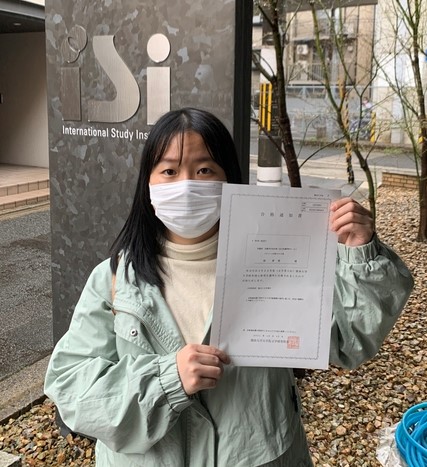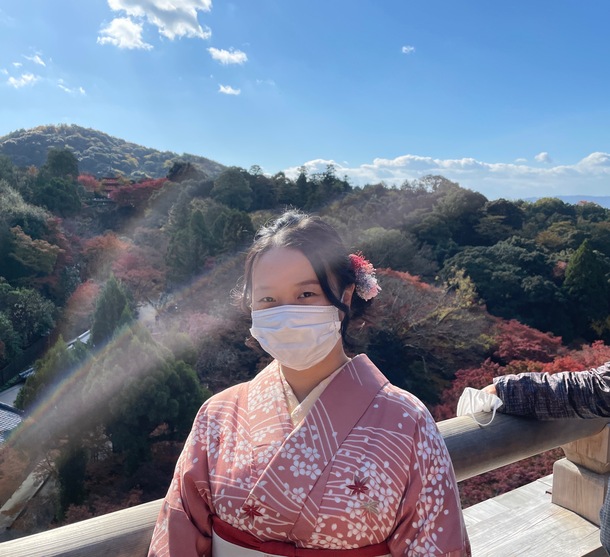Student Interview with Yin Mengqian
- Home
- School Life
- Student Interview
- Student Interview with Yin Mengqian
Yin Mengqian
From China
Kyoto Campus / Advanced III-4
Kansai University Graduate School Graduate School of Literature
Comprehensive Humanities (Research Student) Passed
- Please introduce yourself.
- My name is Yin Mengqian. I am from Changsha, Hunan Province, China. I am from the Department of Accounting at Hunan University.
I am a positive and optimistic person. I became interested in Japanese manga when I was in high school and was considering studying in Japan at the time, but for various reasons I decided to continue my education in China. After graduating from college, I was temporarily lost, but then I ran into a teacher who had taught me Japanese in high school, and my interest in studying in Japan and Japanese language education was rekindled, and I came to Japan with a renewed determination. - Why did you choose Kyoto School?
- I like Kyoto's laid-back pace of life. I think it is a very peaceful place, suitable for healing the body and mind, and I choose ISI because of its multinationality and high percentage of students going on to higher education.
- Can you tell us about your experience taking the entrance exam for the graduate school of Kansai University?
- When choosing a graduate school, I referred to the Japanese university rankings, selected the major I wanted to go for, and then chose a teacher based on the major. At first, I looked for 50~60 teachers at once, but decided to narrow it down on the advice of my homeroom teacher. In the end, I chose Kansai University because I thought it had teachers who would guide me well and lay the foundation for my future research.
I have been accepted to the Graduate School of Integrated Humanities at Kansai University as a research student in the field of education. I will enroll as a research student in April and take the examination for the master's program in July. If all goes well, I will advance to the master's program in October.
My research is on moral education, focusing on the issue of bullying in schools. In China, "bullying" often refers to inappropriate punishment from teachers to students, while in Japan it mostly refers to violence between students. - How are your studies at the Kyoto School?
- The most difficult thing for me when preparing for the exam was that I did not understand the technical terms because my graduate major was different from my undergraduate major. Even in Chinese, there were some terms that I did not understand, so it was even more difficult for me to understand Japanese. I consulted my homeroom teacher, Ms. Negishi, and she taught me various Japanese expressions. I am very grateful to her.
In addition, Ms. Ono, my academic advisor, guided me in the interview process many times and helped me correct my oral expressions into more natural Japanese.
In terms of daily life, Ms.Yamada and Ms.Imagawa helped me with my cell phone card and bank card procedures. Thanks to them, I managed to get through my first month in Japan. - Please tell us about your method of learning Japanese.
- I had passed N2 before coming to Japan, but after a year of study abroad, I passed N1.
I memorized 30 Japanese words using the app every day, and I focused on practicing the same words repeatedly to consolidate my memory. For reading skills, I read 2 to 3 out of 10 articles carefully, analyze the grammar and word usage in the sentences, mark them, and summarize them in a notebook. As for my listening skills, as an anime fan myself, I watch a lot of anime, so I believe my ear has improved. In terms of speaking ability, I shadow (*) every day in class at the Kyoto School, which has improved my conversational skills based on a wide range of topics.
*Shadowing: A method of practicing reading aloud while listening to a model Japanese voice and covering your voice with it. - What are your plans after graduation?
- After graduating from the master's program, I would like to return to my home country and teach Japanese at an educational institution in my hometown. Also, if the corona subsides, I would like to temporarily return to China after my graduation year to obtain a license to teach Japanese in China. Learning Japanese makes me very happy. I would like to become a Japanese teacher in the future so that more people can feel this happiness.



